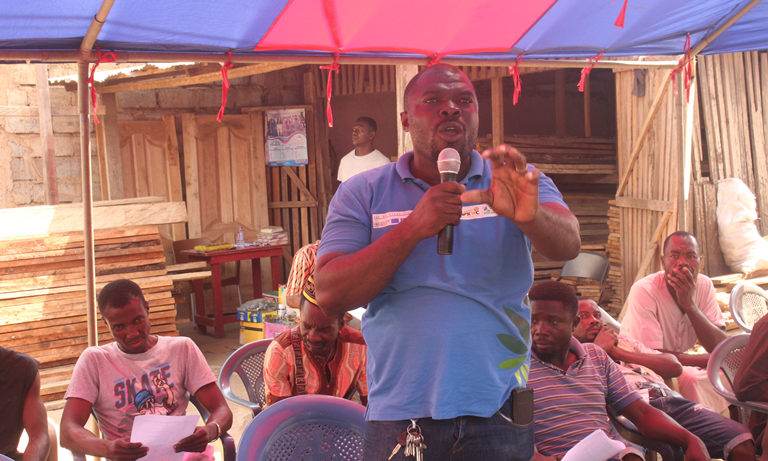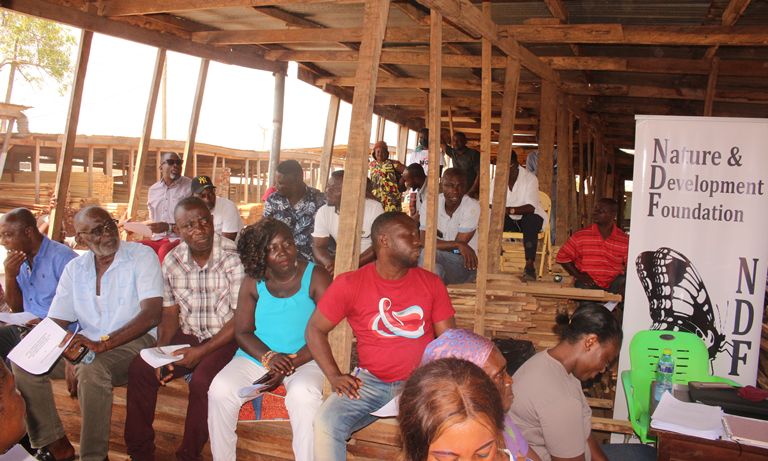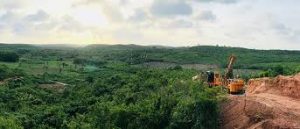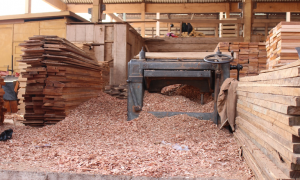“Bush Cut” timber vendors seek business recognition
Some vendors of chainsaw lumber (illegal wood) popularly called ‘Bush Cut’ at the Muss Timber Market, Accra, Tema, Ashiaman, Sokoban Wood Village, Ahwiaa, Akwadaso, Kyireapatre and Santaase timber markets, are calling for the regularization of their businesses to make it an open door for government to rope in more revenue for development.
They say, government is losing huge sums of revenue because, they don’t pay taxes on their business and are calling for their registration and regularization. “Assess the number of people involved in the business you are terming as illegal, quantify the volumes of wood traded and calculate the monies that could be generated as taxes should we have been duly recognized and registered to be paying taxes. Year on year, we would have renewed our registrations with the Timber Industry Development Division (TIDD) and also paid taxes on our income to government but government is losing all that money”.
The vendors made this request when officials of the Nature & Development Foundation (NDF), accompanied by officers from the TIDD and Ghana Revenue Authority (GRA) visited the timber markets to educate the vendors on the need for them to be registered with the TIDD, and acquire the requisite documents that will be required for the registration as well as be involved in the processes of proper documentation. Advancing their arguments, the vendors said, chainsaw lumbering also known as “bush cuts” is not illegal as perceived generally because they believe the Government of Ghana approves of it.
According to them, “If it’s indeed illegal, why doesn’t the government arrest us when we place the products on the market? or even come to the market to confiscate the products?” The vendors also claimed that the wood being termed as illegal is what government purchases for most, if not all, of its developmental projects.’
They questioned the feasibility of the Public Procurement Policy on Timber and Timber products, arguing that “it’s been years since we heard there was going to be a policy to restrain contractors from using chainsaw lumber for public works, where is the policy? Why hasn’t it been passed up till now? Look, we are reliably informed that the policy was thrown out of cabinet. Why would cabinet throw out the policy if indeed they deem bush cut lumber as illegal?,” emphasizing that government supports the bush-cut lumbering work they are engaged in.

The sawmill lumber, according to them, is only few and not enough to satisfy demand for wood on the domestic market, claiming that the “bush cut” business contributes greatly to most developmental works in the country.
In a bid to explain acts that are termed illegal in the country, the vendors compared government’s stance on marijuana also called weed and cocaine and the actions taken against users of the substance as against their products. They said, “occasionally, the police swoop in on areas suspected to be inhabited by people dealing in weed and cocaine because they are considered illegal. However, in our case, the government even comes to patronise our products once we have managed to get it to the market and even bargain for reduction, so we are not committing any illegality by trading in bush-cuts”.
Officers from the Timber Industry Development Division (TIDD) of the Forestry Commission Mr. E. K Bonney and Madam Matilda Nsiah Boatemaa, who disagreed with the claims of the vendors, asked; “why their products are arrested when found in the forest and on the roads whiles they are transporting them?”.
Responding in a baffled manner, the vendors said “honestly, we think it’s probably a strategy you Forestry Commission people have adopted to merely worry and extort monies from us. How can you term the act (chainsaw lumbering) and the products (Bush Cuts) as illegal yet you only arrest culprits in the forests and on the roads but not in the market where the products are openly displayed for sale?’ ‘You even turn around and purchase some for your buildings and other infrastructural works’.

They accused the Forestry Commission officers for crippling the businesses of those engaged in the saw-mill lumber trade or what is termed as legal. They said, the innocent timber men suffer from high fees, to delays on the road to arrests for improper documentations when in actual sense the said documents have been prepared by officials of the commission.
“So please advise the government to reconsider its decision and openly approve of our businesses as it will enable us pay taxes to the government to support its developmental works in the country. So, Madam, allow us to register and get listed on your platform as well because we also want to increase sales.’
NDF’s visit to the markets was to enable the foundation boost patronage of its online timber market platform, www.ghanatimbermarket.com which was developed as part of implementing the Ukaid funded project, “Building the Capacities of Small and Medium Scale Forest Enterprises in Ghana and Liberia to Trade and Supply Legal Timber-Phase I”.
According to the projects officer for NDF, Ms Margaret Appiah, the platform was developed to promote trade in legal wood (linking buyers to sellers of legal wood) but is currently inactive because almost all vendors of timber on the domestic market of Ghana are not dully registered with the TIDD hence they are unable to list their products on the platform as it is a pre-requisite. The objective of the activity is to educate the vendors and get them registered with TIDD to enable them trade on the platform.
Again, the market engagement activity by NDF is part of implementing the project, “Building the Capacities of Small and Medium Scale Forest Enterprises in Ghana and Liberia to Trade and Supply Legal Timber-Phase II” which is funded by Ukaid under the Forest Governance Market and Climate (FGMC) programme.
AUTHOR
Nature & Development Foundation


